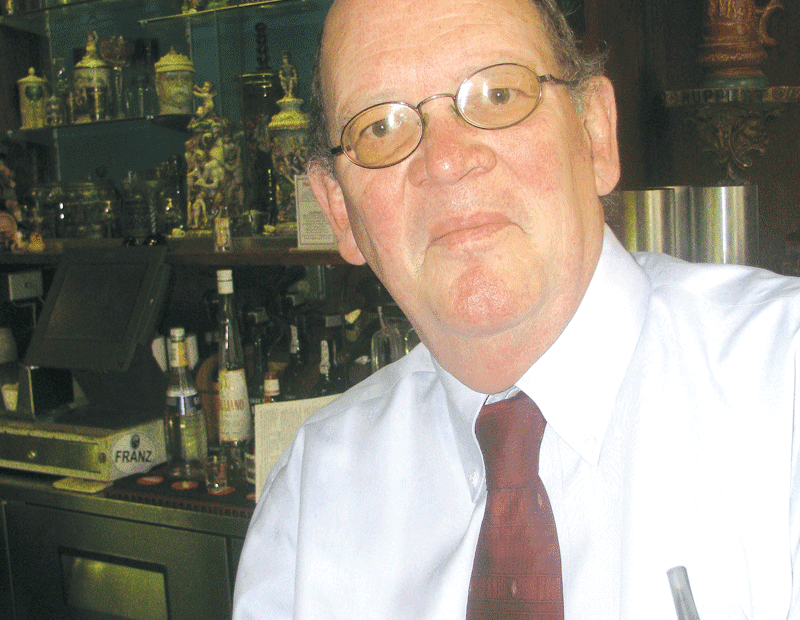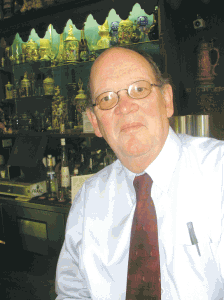
Profiles in Business
His Job Description? Holding Down the Fort
Rudi Scherff started washing dishes at the Student Prince restaurant, then co-owned by his father, Rupprecht, when he was 12 years old. This means that, among many other things, he has a half-century’s worth of perspective on downtown Springfield.He’s seen quite a bit of change in and around the central business district over that time, with much of it, by his estimation, being not exactly good for business.
“Years ago, people had to come downtown to see their lawyer or their dentist,” he said, noting that, while doing so, they would often stop in for lunch. “Now, that’s pretty much disappeared. When I was a teenager, I’d walk to the bank with my dad, and maybe 60% of the men you saw were wearing a sportcoat and tie, even in July; now, collars are a rarity, never mind ties.”
There have been other changes beyond dress and an outmigration of professionals, he added. There are fewer stores and far fewer restaurants downtown, and where once many white-collar workers lived downtown, now, the vast majority of housing is of the subsidized variety.
Through all of this change and societal evolution, the Student Prince, or the Fort, as it’s called colloquially, has been a constant (this year marking its 75th anniversary), when so many other establishments fail to keep the doors open even a tenth that time. When asked to articulate on the landmark’s longevity, the soft-spoken but opinionated Scherff said it comes down to consistency but also flexibility and adjusting to those changing times.
Elaborating, he said that, where once most customers and potential customers were content to simply have a nice meal and perhaps some accompanying liquid refreshment, many people today want “an experience.”
“As a result, we’re a little more in the entertainment business and less in the basic sustenance business,” Scherff explained. “Some people just want to come out and have something to eat, but I think more people are looking for that experience, they’re looking a novelty, for more than just stomach filling.
“So we change our menus a lot more, we’ll do many more seasonal specials, we’ll do a lot of different desserts,” he continued. “We try to give people reasons to come in, be it with soft-shell crabs in July or native corn; we try to have some variation of products. Sometimes things succeed, and sometimes they don’t.”
For this, the latest installment of its Profiles in Business series, BusinessWest turns the spotlight on one of Springfield’s most noted restaurateurs, who may not be quite the institution his father was, but has been equally successful in holding down the Fort.
A Lot on His Plate
Scherff never expected to follow in Rupprecht’s considerable footprints, even though he practically grew up in the restaurant and held just about every job in the place.
The plan was to become a lawyer, and, by and large, things went according to script. Scherff earned his juris doctorate from Boston College and settled into private practice in Springfield in the early ’80s. He focused on criminal work and handled some real estate. “Some of it I enjoyed, but all that paperwork … I didn’t really care for that.”
He had been in practice about a decade, and doing reasonably well, when his father’s failing health forced him to eventually slow down. Rudi, who would work in the restaurant on occasion, especially during peak times of the year, found himself having to pitch in much more and attempt to juggle two vocations.
“I tried to do both for a year,” he said, “but decided that I wasn’t being fair to the law practice, the restaurant, or myself.” So he left the legal profession in the early ’90s, and, with his sister, Barbara, brother, Peter, and nephew, Michael, now the kitchen manager, he continues the Fort tradition, which began in 1935.
When asked for his job description, Scherff said there are many elements to it. “I keep my eyes open, see what’s happening, and see if the customers are enjoying themselves,” he said, offering first the long view of what occupies the 60 or so hours a week he spends at 8 Fort St. “I do the scheduling and the ordering, and supervise menu development — all the little things that don’t fit in the pigeonholes.”
Also on that list is listening to stories about his father, who passed away in 1996, and there is no shortage of them coming from the Fort’s legion of long-time and sometimes very long-time customers.
“Some of these stories are true, some of them are not true,” he said, “but far be it for me to ruin someone’s memories.”
Scherff has many of his own memories from five decades on Fort Street. He’s watched the restaurant, famous for its collection of beer steins, stained-glass windows, and Roquefort dressing, expand and evolve, while also gaining a place in both the local lexicon and the national trade media.
Indeed, when, in 2008, Gourmet magazine printed its list of “legendary restaurants,” establishments that had been in business since before the magazine started publishing in 1941, the Student Prince was on it.
“We didn’t know it was coming,” Scherff said of the listing in Gourmet. “They just said, ‘we’re doing an article … you may or may not be in it.’ They were kind enough to send us a copy of the magazine, and it came the same day as we were having our Hampden Street Octoberfest. It was a very exciting day for us.”
Scherff said the Student Prince has hosted its share of celebrities over the years. John Kennedy frequented the restaurant when he was a senator, and his brother, Ted, did as well. Wilt Chamberlain dined there, as have others from the world of basketball visiting the birthplace of the game. Roy Rogers stopped in a few times, John Ratzenberger paid a visit when he was in town several weeks ago (and ordered a bologna sandwich), and Scherff has fond memories of when John Denver came in for dinner.
“Some of the guys in the kitchen wanted autographs,” he recalled. “When I asked him if he would sign a few, he said, ‘no, I’m not going to do that here,’ and promptly went out to the kitchen, thanked everyone, and signed them back there. He was a real gentleman.”
But while having stars in the dining room is great for any restaurant in terms of creating lasting memories for staff and patrons alike, Scherff said one doesn’t build a business and keep it open for 75 years because a few singers, politicians, and hoop legends stop in on their way to somewhere else. “All that’s wonderful,” he said of the celebrities, “but the guy who comes in once a week and has bratwurst and a beer or two is much more important to me.”
Such customers have been the lifeblood of the Student Prince, and while Scherff says there are still enough of them to keep the business humming, times are changing in the area, and they are making life more challenging for the current generations managing the landmark.
For starters, there are those changing trends and demographics downtown, which combine to create fewer of the kinds of customers the Fort has always thrived on. Also, the Fort, like all establishments downtown, has to contend with the negative perceptions of the area and the lack of free parking. In the meantime, there is considerable competition, both in the suburbs (much more than in decades past) and along Springfield’s riverfront.
On the brighter side, Scherff says he seeing some signs of a comeback in downtown Springfield, although he keeps his optimism guarded. He notes with enthusiasm the retenanting of the old federal building and other efforts to bring more workers to the central business district. Meanwhile, he sees some signs of progress bringing more professionals into the area to live.
“Hopefully we’re starting to see downtown come back a little bit,” he told BusinessWest. There are some things happening that give you reason to think that things are going to get better.”
Check, Please
When asked what he does when he’s not keeping an eye on things at the Student Prince, Scherff says he works, often in frustration, in his garden, and that he’s trying — that’s trying — to take up woodworking.
“I bought a lot of equipment, and I still have all my fingers, so I guess that’s good,” he joked, before admitting that, between his family (and especially twin 16-year-olds) and the family business, there simply isn’t time for much else.
And while he’s thinking about somehow trying to pare some of those hours he spends at and on the restaurant, he knows he can’t pull back too much. “I’d go crazy if I wasn’t here a lot,” he said.
Which means that he’ll log many more years of reflections on downtown Springfield. Times may never be as they were when the sidewalks were crammed with people and all the men wore suits and ties, but Scherff can easily envision much better times for the downtown that’s been his real home for the past 50 years.
George O’Brien can be reached at [email protected]





